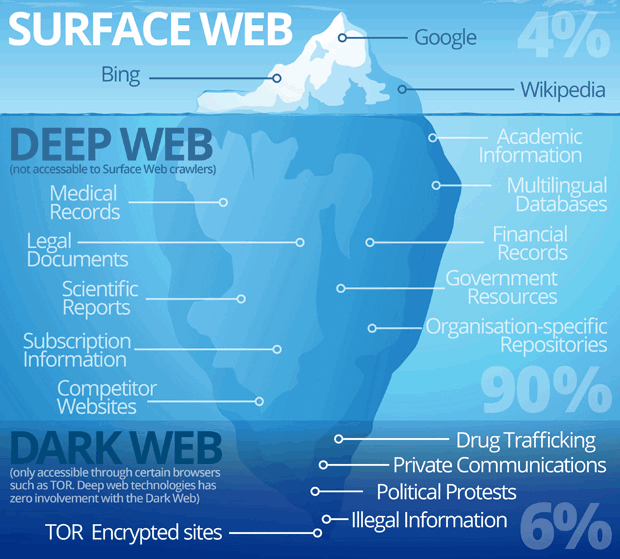
BlackFog recently introduced Dark Web protection to prevent data loss, activation and transfer of malware over the Dark Web. With an exponential increase in activity over the Dark Web over the last 12 months it is crucial that your devices are protected from this new threat. The Dark Web ransomware economy alone is growing by 2,500% annually. But what is the Dark Web and how are you vulnerable?
What is the Dark Web?
The Dark Web is an anonymous network that can only be accessed by browsers such as Tor. By content alone it is larger than the standard indexable Web that we use everyday by about 50% and represents approximately 6% of all sites. In contrast, the standard Web represents approximately 4%. The remaining sites, often referred to as the Deep Web, include non-indexable content managed by private organizations such as governments, corporations and other institutions.
The purpose of the Dark Web is to enable anonymous access to content and prevent the identification of both the request and destination. This is achieved by anonymizing all transactions by routing requests through multiple servers across multiple continents before providing the content to the end user. It is commonly used for private communications and is a haven for illegal activity. There are few legitimate reasons to be using this network and it cannot be accessed from a standard web browser.
Since this network is anonymized by design, it is used by hackers to hide their true identity. Malware developed by these attackers usually includes (especially when dealing with ransomware) activation and transmission of data over this network. This includes ransom payments to the attackers, which normally consists of Bitcoin transfers (which is also anonymous).

Do Antivirus products protect me?
Any device with Internet access is vulnerable to data loss and malware over the Dark Web. Antivirus (AV) solutions do not provide the protection you need. AV solutions are only useful after you have been infected, not as a preventative measure.
BlackFog provides an additional layer of protection on your device by monitoring network packets in real-time and blocking application access to the Dark Web and many other suspicious activities. Unlike antivirus software which uses signature based techniques, BlackFog uses next generation multivariant behavioral analysis to prevent attacks and reduce the total surface area exposed to cyber criminals. This includes blocks based on geography, DNS and network anomalies, advertising, profiling and tracking and other data harvesting techniques used by cyber criminals.
To ensure you are protected from these new data harvesting techniques be sure that your solution includes preventative measures for Dark Web data loss prevention and identity theft.
Related Posts
BlackFog Report Reveals Record Number of Ransomware Attacks from January to March
BlackFog reports a record-breaking surge in ransomware attacks Q1 2025, with 278 disclosed cases and a 113% rise in undisclosed incidents.
AI for Network Security and Monitoring: Enhancing Cyber Defense
What opportunities do AI ransomware protection tools offer to cybersecurity pros?
Log4Shell – Understanding the Vulnerability and Mitigation Steps
Learn about Log4Shell, its impact on industries, and effective mitigation strategies. Discover how proactive defenses, like BlackFog's ADX technology, can protect your systems from ransomware and data exfiltration.
Ransomware Attacks on macOS and Other Apple Devices: A Growing Threat
Apple devices are no longer immune to ransomware. Attacks on macOS and iOS are rising, with threats like NotLockBit emerging. Learn why Apple is a target and how to protect your devices from evolving cyber risks.
The State of Ransomware 2025
BlackFog's state of ransomware report 2025 measures publicly disclosed and non-disclosed attacks globally.
AI and Ransomware Prevention: How Smart Tech can Outsmart Cybercriminals
What opportunities do AI ransomware protection tools offer to cybersecurity pros?






